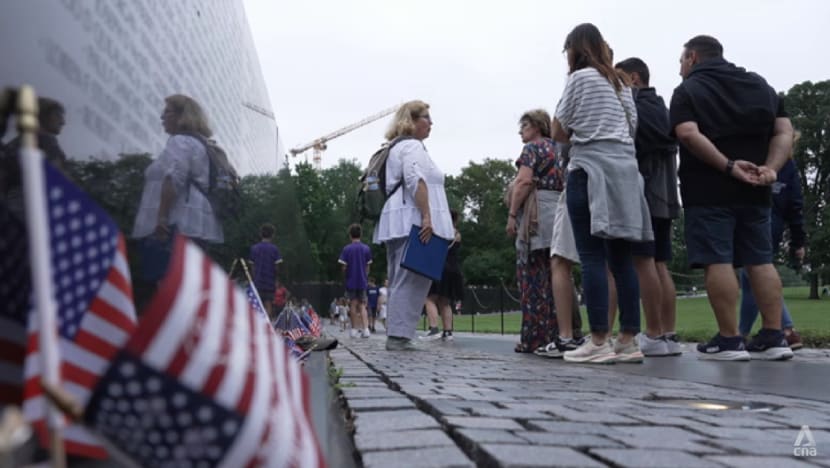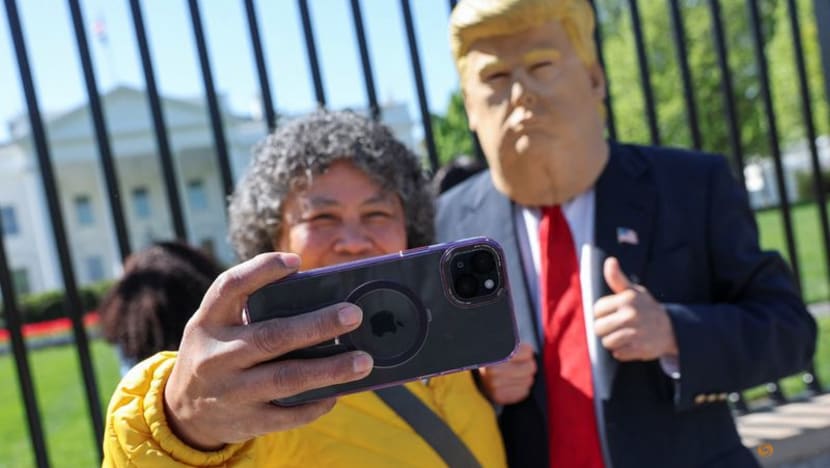Fears over how Americans are perceived abroad dampen US travel enthusiasm
Tourists are staying away due to sweeping tariffs, worrying foreign policies, border crackdowns and an uncertain economic climate, say experts.

A tour guide brings tourists around Washington DC.

This audio is generated by an AI tool.
WASHINGTON: The summer travel season is in full swing, but there are signs Americans are packing something else in their luggage this year – anxiety about how they are perceived abroad.
According to a recent survey by risk management firm Global Rescue, 72 per cent of experienced travellers from the United States believe Americans will be viewed more negatively due to policies from the White House.
Outside Buckingham Palace in London, a group of Floridians told CNA that as staunch supporters of US President Donald Trump, they were concerned about how they would be received.
They said they are taking precautions to stay out of any political fray.
“As long as I just don’t … wear a Trump hat or something like that, I wouldn't feel exactly targeted,” one said.
Another American couple at the iconic British landmark said: “We don't talk about politics. We stay away from it.”
A study by the European Travel Commission showed that just 33 per cent of American respondents plan to visit Europe this summer – a 7 per cent drop from last year.
Since his return to the White House in January, Trump has rekindled fears of a collapse in European alliances, initiated a global trade war and cracked down on immigration at home.
According to crisis response company Global Rescue’s traveller sentiment and safety survey, respondents say they are steering clear of China, Mexico, Canada and France.
Aside from anti-Americanism dampening enthusiasm for travel, experts said Trump’s economic policies could also be a factor.
With mass layoffs of federal workers and fears of a tariff-induced recession, George Washington University professor of sport, event, and tourism management Lisa Delpy Neirotti said it is all about the bottom line.
“Americans are concerned whether they're going to lose their job if prices are going to double. And so, many are staying low,” she said.
“They're putting money in the bank and have decided not to travel this year or to travel very local.”

INBOUND TRAVEL ALSO IN LULL
The trend is also holding true for overseas visitors to the US.
The tourism industry added more than US$2.6 trillion to the American economy last year, supporting more than 20 million jobs.
But this year, international arrival numbers are down as travellers weigh rising costs and their sentiments about the US. Businesses in the sector are feeling the pinch.
Catherine R, a tour guide in the US capital of Washington DC, said her business has dropped by about 85 per cent since Trump resumed office. She caters to clientele mainly from Canada, France and Germany.
Inquiries from Canadians, in particular, have dried up ever since Trump repeatedly suggested the country become the 51st US state, she said.
She gave just five tours in June – far below the 25 she normally does for the month.
“Economically, it’s a war. It’s an economic war announced to everyone,” she lamented.
Sweeping tariffs levied by the Trump administration on most of the world – many of which are paused until Jul 9, pending negotiations – is another reason deterring tourists from visiting, said observers.
Visitors have also voiced concerns about the crackdown on immigration and fears that they could be denied entry or even detained by border agents.
Official data showed that international arrivals to the US were down more than 5 per cent year-on-year in May.
Lower tourist numbers will lead to fewer hotel bookings and less spending in retail, restaurants and entertainment, which will in turn hit the domestic economy, said analysts.
“Foreign visitors to the US spend, on average, twice what domestic visitors spend per capita,” said professor Andrew Coggins of Pace University’s Lubin School of Business.
The World Travel and Tourism Council said the US is set to lose out on US$12.5 billion in international spending this year. It is the only country among the 184 it analyses that is facing a revenue downturn.
Nejc Jus, the council’s head of research, said the effects will ripple out to the broader economy.
“GDP (gross domestic product) that could have been created by increased international spending would not be created,” he noted.
“An enormous number of jobs that are supported by tourism would be at risk, as well as whole tourism communities.”












